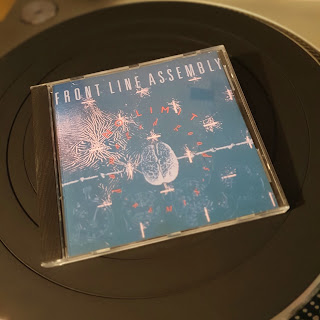The second copy is the white vinyl from the "Play to Win: The Virgin Years" box set of 2019. The artwork for the new version has obviously been scanned and gives the impression of having been printed much more heavily as a result.
Whilst both records sound pretty good, I'm choosing to play the original here as the discs are a bit difficult to extract from the box set.
Opening track "(We Don't Need This) Fascist Groove Thing" is a timely and depressing reminder that politics haven't changed much over the last forty years. This record was banned from the BBC when it was released as a single and this is thought to have led to its relative lack of success. Yet, even if it were being played on national radio, I'm not so sure this track had enough hooks or gags to interest the record buying public en masse.
The familiar title track is a blend of slap bass, female backing vocals, grand piano and an incessant Linn LM1 pattern. "Play to Win" continues to lean on John Wilson's guitar skills to underpin the synth horns and Glenn's impressive vocal. The concept of this first "Penthouse" side of the disc is encapsulated by the soul/funk sound of "Soul Warfare". Naive block chords are pounded out on the grand piano as the elaborate slap bass rattles around. Most of the tracks on this side of the record are good, but they rely too heavily on the influences of soul and blues for my taste.
For me, the real action on this record is the "Pavement" side which dispenses with the slap bass and relies on synthesisers. "Geisha Boys and Temple Girls" sounds completely under produced by today's standards, but it does have a great melody. The brilliant "Let's all Make a Bomb" has some subtle harmonic elements, but it really would benefit from a bassline or some other rhythmical elements. I don't know if the sparse production on this album is a style choice or if the band just didn't have enough synthesisers.
The first electronic bassline is encountered on "At the Height of the Fighting" which thankfully omits the brass section that was overdubbed onto the "He-la-hu" single version. There is some album filler called "Song With No Name" to be dealt with before the final track "We're Going to Live for a Very Long Time" is heard. The original record ends in a locked groove that plays the "For a very long time" refrain until you lift the needle. On the 2019 repressing the refrain is looped for about a minute and then fades out - no doubt the master for the repressing was the same digital one used for CD. 3/5

































